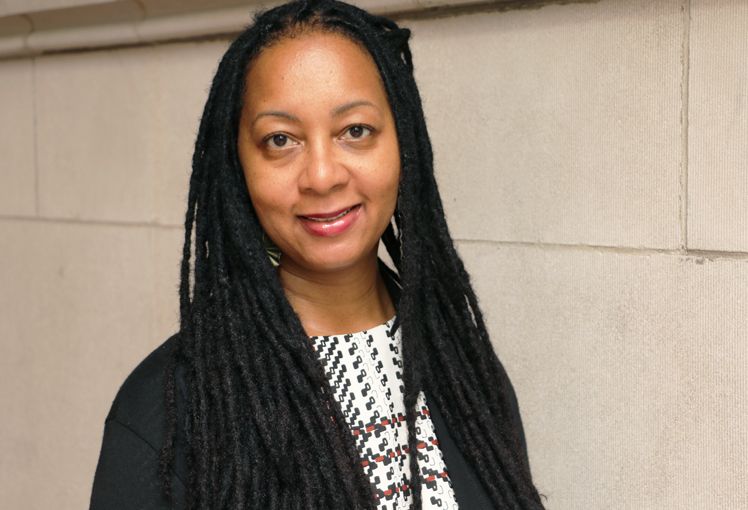Nadine Bryce

Associate Professor of Literacy
A theme that connects Dr. Bryce’s research and teaching is the notion that literacy is a set of social practices developed and used in particular social and cultural groups. As such, literacy makes no sense outside of the social contexts in which it occurs. Members of particular socio-cultural groups read, write, speak, listen, view, and interpret visual information to construct meaning, and through patterned ways of using literacy, take on roles and identities that signal their membership in these socio-cultural groups. Teachers and students are engaged in the work of creating recognizable identities as they engage in their teaching and learning activities. Dr. Bryce believes it is important to help teacher candidates recognize the socially situated nature of literacy, demystify the monolithic view that there is a “right” and “wrong” way to engage in literacy practices, and expand candidates’ awareness that the selection and implementation of literacy activities, even those considered “research-based,” is a value-laden process steeped in cultural understandings.
Dr. Bryce taught in New York City urban public and private elementary schools as a regular classroom teacher and reading specialist, taught middle school students in a specialized tutoring program, and taught high school students in an academic writing enrichment course she developed using technology to enhance the writing process and facilitate writing production. These years of classroom experience laid the foundation for perspectives that inform her work as a teacher educator, namely one that recognizes a multimodal, multi-literacies view of pedagogy that teaches youth to negotiate an ever-expanding plurality of texts and discourses in our culturally and linguistically globalized societies.
- Ed.D. in Reading and Language Arts. Teachers College, Columbia University, 2003.
- Ed.M. in Language and Literacy. Graduate School of Education, Harvard University, 1997.
- B.S. in Elementary Education. York College, CUNY, 1994.
Dr. Bryce served as a faculty member in the Childhood Education program in the Department of Curriculum and Teaching, teaching introductory and advanced undergraduate and graduate courses.
- QSTA 401.80 Teaching Developmental Reading
- CEDC 704 Developmental Reading
- CEDC 724, 725, 726 Student Teaching in Grades 1 – 6
- CEDC 729 Fieldwork in General Education for Special Educators
- CEDC 729.5 Fieldwork in General Education for Bilingual Educators
- CEDC 772 Fieldwork and Teaching Seminar 1
- CEDC 773 Fieldwork and Teaching Seminar 2
- EDUC 491 Independent Study
Dr. Bryce also served as a faculty member in the Graduate Program in Literacy Education.
- EDLIT 734 Literacies within the Disciplines, Grades 1 – 6
- EDLIT 754 Literacies within the Disciplines, Grades 5 – 12
- EDLIT 736 Diagnosis of Reading Difficulties
- EDLIT 737 Practicum in Remedial Reading
- EDLIT 742 Practicum in Literacy
- EDLIT 757 Practicum in Literacy Assessment and Intervention
Dr. Bryce carries out school-based research and scholarly writing about literacy pedagogy, with attention to arts integration, nonfiction reading and writing, and the use of print and visual texts to support content area learning in general education, special education, and bilingual settings. She also explores models of teacher education and the development of teaching identities.
- Bryce, N., Wilmes, S. & Bellino, M. (2016). Inquiry identity and science teacher professional development. Cultural Studies of Science Education. DOI 10.1007/s11422-015-9725-1
- Bryce, N. (2014). Teacher candidates’ collaboration and identity in asynchronous online discussion. Journal of University Teaching and Learning Practice, 11(1).
- Bryce, N. (2013). Textual features and language demands of science textbooks in the primary grades. In M. S. Khine (Ed.), Critical analysis of science textbooks: Evaluating instructional effectiveness (pp. 101 – 120). New York: Springer.
- Bryce, N. (2012). Arts-based nonfiction literacy and content area learning. In M. D. Avgerinou, S. B. Chandler, & M. Terzic (Eds.), New Horizons in Visual Literacy: Selected Readings of the International Visual Literacy Association (pp. 46 – 61). Lithuania: Scientia Educologica.
- Bryce, N. (2012). “Mano a Mano”: Arts-based nonfiction literacy and content area learning. Language Arts, 89 (3), 179 – 193.
- Bryce, N. (2011). The social self in a virtual context: Teacher candidate identities in online dialogue journals. Excelsior: Leadership in Teaching and Learning, 6 (1), 27 – 40.
- Bryce, N. (2011). Meeting the reading challenges of science textbooks in the primary grades. The Reading Teacher, 64 (7), 474 – 485.
- Bryce, N. (2010). Review of Spears-Bunton, Linda A. & Powell, Rebecca (Eds.) (2009). Toward a Literacy of Promise: Joining the African American Struggle. New York: Routledge. Education Review: A Multi-lingual Journal of Book Reviews.
- Bryce, N. (2009). Collaboration in asynchronous online discussion: Graduate teacher education candidates and the politics of online dialogue journaling. Refereed proceedings from The 2nd International Multi-Conference on Society, Cybernetics and Informatics, 1, 126 – 131.
- Bryce, N. (2008). Practical recommendations for teaching emergent literacy learners in English. BETAC Quarterly Newsletter, 1(2), 2 – 3.
- Bryce, N. (2007). Online dialogue journaling in graduate literacy teacher education: Identity and knowledge construction. Refereed proceedings from The 5th International Conference on Education and Information Systems, Technologies and Applications in the context of The International Multi-Conference on Society, Cybernetics and Informatics, 2, 29 – 33.
- Bryce, N. (2006). Literacies for all: Spanish-English speaking second grade students write science. The International Journal of Learning, 13(5), 99-108.
- Bryce, N. (2003). Book Review: Si, Se Puede! Yes, We Can! Janitor Strike in L.A by Diana Cohn. El Paso, TX: Cinco Puntos Press. ENCOUNTER: Education for Meaning and Social Justice, 16(2), 60-62.
- “Primary grade students’ use of literacy in science,” $5,989.93 from Hunter College, CUNY. PSC-CUNY Award. July, 2008 – December, 2010.
- “Faculty Fellowship Publications Program,” 3-credit course release, CUNY, 2007.
- “New Faculty Mentoring Program,” $100 from Division C: American Educational Research Association, 2006.

